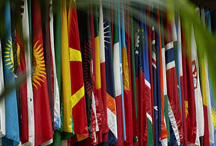
Typical street scene in Santa Ana, El Salvador. (Photo: iStock)
IMF Survey: IMF Reform Secures Backing By Wide Margin
April 29, 2008
- Board of Governors approves IMF's quota and voting share structure changes
- Governors representing 93 percent of voting power supported resolution
- Move will enhance representation of emerging market and developing countries
The IMF's Board of Governors has adopted by a wide margin far-reaching reforms of the institution's governance, supporting measures to increase the voting shares of a majority of the 185 member countries.

Flags of IMF members: countries around the world approved the reform of the IMF voting structure. (photo: IMF)
Country representation
The IMF said that by a deadline of April 28, Governors from 180 of the 185 member countries had cast their votes on the proposed reform package.
Of these, 175 countries representing 93 percent of the total voting power in the Fund voted in favor of changes to the quota and voting share structure. Three countries voted against, two abstained, and five did not vote.
The changes will enhance the participation and voice of emerging market and developing countries, and realign members' shares with their relative weight and role in the global economy. Approval of the Resolution required 85 percent of the total voting power.
Overwhelming support
"This vote shows the overwhelming level of support across the Fund's membership for these reforms, and I thank the members for this resounding endorsement," said IMF Managing Director Dominique Strauss-Kahn. "I see this result as the beginning of the new legitimacy of the Fund."
"This makes the Fund the first international financial institution to implement such deep governance reforms," Strauss-Kahn added. He said that 95 percent of the institution's members had supported the reform.
"As a result of these changes, the Fund's quota and voting structure will be more dynamic and forward-looking," Strauss-Kahn said. "The new structure represents an important step toward a redistribution of voting shares toward dynamic emerging market and developing countries and we expect to see a continued shift over the next decade."
Enhanced position of low-income countries
In addition to changes in the quota structure, the reform package, recommended by the IMF Executive Board on March 28 (see Press Release No. 08/64), will increase the voting shares of more than two-thirds of the 185 member countries. It will also enhance the voice and participation of low-income countries through a tripling of basic votes—the first such increase since the Fund's creation in 1944—and will enable each of the two Executive Directors representing African constituencies to appoint an additional Alternate Director.
"In particular, the tripling of basic votes reflects an innovative part of this reform effort, aimed at enhancing engagement and voice of our low-income members," Mr. Strauss-Kahn added. "To preserve this element of the reforms, the package includes a mechanism that will keep constant the ratio of basic votes to total voting power in the IMF."
The Governors' vote marks an important step in putting into effect the package of reforms. The Resolution proposes an amendment of the Fund's Articles of Agreement, which will need to be accepted by at least three-fifths of IMF members representing 85 percent of the total voting power in order to become effective. Most member countries will need the approval of domestic legislatures to accept the proposed amendment. The proposed increase in quotas will also require further action on the part of those member countries eligible to receive an increase in their quotas.
The Board of Governors is the highest decision-making body of the IMF and consists of one governor and one alternate governor appointed by each member country. The governor is usually the minister of finance or the governor of the central bank. Most powers of the IMF are vested in the Board of Governors. The Board of Governors may delegate to the Executive Board all except certain reserved powers. The Board of Governors normally meets once a year.
Two-year program
The reform of country representation is part of a two-year program approved at the 2006 Annual Meetings in Singapore, when initial ad hoc increases in quotas were agreed for China, Korea, Mexico, and Turkey. A country's quota at the IMF largely determines its voting power in the 185-member institution.
Reforms at the IMF had received strong backing in early April from the IMF's policy-guidance committee, the IMFC, which welcomed the recent agreement by the Executive Board on quota and voice reforms "as an important contribution to enhance the Fund's credibility and legitimacy."
The IMFC also endorsed the recent agreement by the Executive Board on a new income model and a new medium-term budgetary envelope, "which will contribute to placing the Fund on a sustainable financial footing."
Comments on this article should be sent to imfsurvey@imf.org


